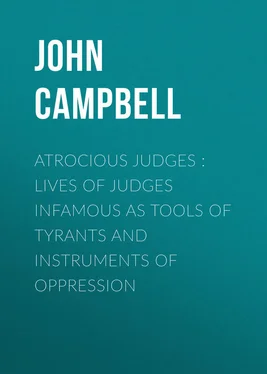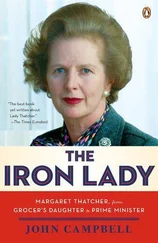John Campbell - Atrocious Judges - Lives of Judges Infamous as Tools of Tyrants and Instruments of Oppression
Здесь есть возможность читать онлайн «John Campbell - Atrocious Judges - Lives of Judges Infamous as Tools of Tyrants and Instruments of Oppression» — ознакомительный отрывок электронной книги совершенно бесплатно, а после прочтения отрывка купить полную версию. В некоторых случаях можно слушать аудио, скачать через торрент в формате fb2 и присутствует краткое содержание. Жанр: foreign_antique, foreign_prose, Биографии и Мемуары, на английском языке. Описание произведения, (предисловие) а так же отзывы посетителей доступны на портале библиотеки ЛибКат.
- Название:Atrocious Judges : Lives of Judges Infamous as Tools of Tyrants and Instruments of Oppression
- Автор:
- Жанр:
- Год:неизвестен
- ISBN:нет данных
- Рейтинг книги:5 / 5. Голосов: 1
-
Избранное:Добавить в избранное
- Отзывы:
-
Ваша оценка:
- 100
- 1
- 2
- 3
- 4
- 5
Atrocious Judges : Lives of Judges Infamous as Tools of Tyrants and Instruments of Oppression: краткое содержание, описание и аннотация
Предлагаем к чтению аннотацию, описание, краткое содержание или предисловие (зависит от того, что написал сам автор книги «Atrocious Judges : Lives of Judges Infamous as Tools of Tyrants and Instruments of Oppression»). Если вы не нашли необходимую информацию о книге — напишите в комментариях, мы постараемся отыскать её.
Atrocious Judges : Lives of Judges Infamous as Tools of Tyrants and Instruments of Oppression — читать онлайн ознакомительный отрывок
Ниже представлен текст книги, разбитый по страницам. Система сохранения места последней прочитанной страницы, позволяет с удобством читать онлайн бесплатно книгу «Atrocious Judges : Lives of Judges Infamous as Tools of Tyrants and Instruments of Oppression», без необходимости каждый раз заново искать на чём Вы остановились. Поставьте закладку, и сможете в любой момент перейти на страницу, на которой закончили чтение.
Интервал:
Закладка:
Noy 46 46 Noy had begun, like Brampston, a flaming patriot, but, like him and so many other lawyers, had been bought over to the side of power by the hope of promotion, and being made attorney general, had advised the issue of the writs for ship money. — Ed.
would have been the man to be appointed chief justice of the King’s Bench to carry through his tax by a judicial decision in its favor, but he had suddenly died soon after the ship money writs were issued; and, after him, Sir John Brampston was deemed the fittest person to place at the head of the common law judges. On the 18th of April, 1635, his installation took place, which was, no doubt, very splendid; but we have no account of it except the following by Sir George Croke: —
“First, the lord keeper made a grave and long speech, signifying the king’s pleasure for his choice, and the duties of his place; to which, after he had answered at the bar, returning his thanks to the king, and promising his endeavor of due performance of his duty in his place, he came from the bar into court, and there kneeling, took the oaths of supremacy and allegiance: then standing, he took the oath of judge: then he was appointed to come up to the bench, and then his patent (which was only a writ) being read, the lord keeper delivered it to him. But Sir William Jones (the senior puisne judge) said the patent ought to have been read before he came up to the bench.” 47 47 Cro. Car. 403. These forms are no longer used. The chief justice is now sworn in privately before the chancellor; and without any speechifying he enters the court and takes his place on the bench with the other judges. But in Scotland they still subject the new judge to trials of his sufficiency; while these are going on he is called lord probationer; and he might undoubtedly be plucked if the court should think fit.
In quiet times, Lord Chief Justice Brampston would have been respected as an excellent judge. He was above all suspicion of bribery, and his decisions in private causes were sound as well as upright. But, unhappily, he by no means disappointed the expectations of the government. 48 48 This is exactly the sort of judges from whom we in America have so much to fear. — Ed.
Soon after his elevation, he was instructed to take the opinion privately of all the judges on the two celebrated questions: —
“1. Whether, in cases of danger to the good and safety of the kingdom, the king may not impose ship money for its defence and safeguard, and by law compel payment from those who refuse? 2. Whether the king be not the sole judge both of the danger, and when and how it is to be prevented?”
There is reason to think that he himself was taken in by the craft of Lord Keeper Coventry, who represented that the opinion of the twelve judges was wanted merely for the king’s private satisfaction, and that no other use would be made of it. At a meeting of all the judges in Serjeant’s Inn Hall, Lord Chief Justice Brampston produced an answer to both questions in the affirmative, signed by himself. Nine other judges, without any hesitation, signed it after him; but two, Croke and Hutton, declared that they thought the king of England never had such a power, and that, if he ever had, it was taken away by the act De Tallagio non concedendo , the Petition of Right, and other statutes; but they were induced to sign the paper upon a representation that their signature was a mere formality.
The unscrupulous lord keeper, having got the paper into his possession, immediately published it to the world as the unanimous and solemn decision of all the judges of England; and payment of ship money was refused by John Hampden alone.
His refusal brought on the grand trial, in the Exchequer Chamber, upon the validity of the imposition. Lord Chief Justice Brampston, in a very long judgment, adhered to the opinion he had before given for the legality of the tax, although he characteristically expressed doubt as to the regularity of the proceeding on technical grounds. Croke and Hutton manfully insisted that the tax was illegal; but, all the other judges being in favor of the crown, Hampden was ordered to pay his 20 s.
Soon after, the same point arose in the Court of King’s Bench in the case of the Lord Say, who, envying the glory which Hampden had acquired, allowed his oxen to be taken as a distress for the ship money assessed upon him, and brought an action of trespass for taking them. But Banks, the attorney general, moved that counsel might not be permitted to argue against what had been decided in the Exchequer Chamber; and Lord Chief Justice Brampston said, “Such a judgment should be allowed to stand until it were reversed in Parliament, and none ought to be suffered to dispute against it.” 49 49 We have seen in America similar attempts to stop counsel from exposing the unsoundness of judicial opinions given in support of the fugitive slave act. — Ed.
The crown lawyers were thrown into much perplexity by the freak of the Rev. Thomas Harrison, a country parson, who can hardly be considered a fair specimen of his order at that time, and must either have been a little deranged in his intellect, or animated by an extraordinary eagerness for ecclesiastical promotion. Having heard that Mr. Justice Hutton, while on the circuit, had expressed an opinion unfavorable to ship money, he followed him to London, and, while this reverend sage of the law was seated with his brethren on the bench of the Court of Common Pleas, and Westminster Hall was crowded with lawyers, suitors, and idlers, marched up to him, and making proclamation, “ Oyez! Oyez! Oyez! ” said with a loud voice, “Mr. Justice Hutton, you have denied the king’s supremacy, and I hereby charge you with being guilty of high treason.” The attorney general, however much he might secretly honor such an ebullition of loyalty, was obliged to treat it as an outrage, and an ex officio information was filed against the delinquent for the insult he had offered to the administration of justice. At the trial the reverend defendant confessed the speaking of the words, and gloried in what he had done, saying, —
“I confess that judges are to be honored and revered as sacred persons so long as they do their duty; but having taken the oath of supremacy many times, I am bound to maintain it, and when it is assailed, as by the denying of ship money, it is time for every loyal subject to strike in.” Brampston, C. J. – “The denying of ship money may be, and I think is, very wrong; but is it against the king’s supremacy?” Harrison. – “As a loyal subject, I did labor the defence of his majesty, and how can I be guilty of a crime? I say again that Mr. Justice Hutton has committed treason, for upon his charge the people of the country do now deny ship money. His offence being openly committed, I conceived it not amiss to make an open accusation. The king will not give his judges leave to speak treason, nor have they power to make or pronounce laws against his prerogative. We are not to question the king’s actions; they are only between God and his own conscience. ‘ Sufficit regi, quod Deus est. ’ This thesis I will stand to – that whatsoever the king in his conscience thinketh he may require, we ought to yield.” 50 50 This is the very doctrine lately revived, in a little different shape, by some of our American divines – that whatsoever the legislative power in its conscience thinks it may require, we ought to yield. — Ed.
The defendant having been allowed to go on in this strain for a long time, laying down doctrines new in courts of justice, although in those days often heard from the pulpit, the chief justice at last interposed, and said, —
“Mr. Harrison, if you have any thing to say in your own defence, proceed; but this raving must not be suffered. Do you not think that the king may govern his people by law?” Harrison. – “Yes, and by something else too. If I have offended his majesty in this, I do submit to his majesty, and crave his pardon.” Brampston, C. J. – “Your ‘If’ will be very ill taken by his majesty; nor can this be considered a submission.”
Читать дальшеИнтервал:
Закладка:
Похожие книги на «Atrocious Judges : Lives of Judges Infamous as Tools of Tyrants and Instruments of Oppression»
Представляем Вашему вниманию похожие книги на «Atrocious Judges : Lives of Judges Infamous as Tools of Tyrants and Instruments of Oppression» списком для выбора. Мы отобрали схожую по названию и смыслу литературу в надежде предоставить читателям больше вариантов отыскать новые, интересные, ещё непрочитанные произведения.
Обсуждение, отзывы о книге «Atrocious Judges : Lives of Judges Infamous as Tools of Tyrants and Instruments of Oppression» и просто собственные мнения читателей. Оставьте ваши комментарии, напишите, что Вы думаете о произведении, его смысле или главных героях. Укажите что конкретно понравилось, а что нет, и почему Вы так считаете.












